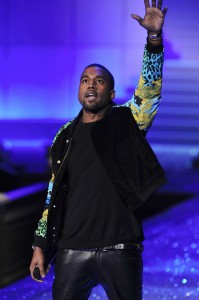
That being said, “Yeezus” is an incredibly bold departure. The new album is his shortest — 10 songs in just 40 minutes — but it’s definitely his most intense. Stripping away the dense layers of sound found on “Fantasy,” “Yeezus” is chock full of angry, buzzing synthesizers and violent, distorted beats. More electronic than hip-hop, it draws as much from Chicago house as the mid-90s industrial chug of Nine Inch Nails and Marilyn Manson. Opener “On Sight” makes this sound very clear; fearsome synths bear their fangs before launching into a minimal house groove (co-produced by electronic luminaries Daft Punk, who contribute to four songs) that is distorted well beyond the point of clipping.
West’s lyrics are no walk in the park either, bitterness going hand in hand with his usual bombast. “If I knew what I knew in the past, I would’ve been blacked out on your ass,” he spits on “Black Skinhead.” “New Slaves” is by far the most upfront, suggesting that black people are still slaves because they’re encouraged to buy expensive material possessions that most cannot afford. Whether or not you believe him, West drives the song with his gusto, his voice edgy and visceral.
It is West’s musings, near-militant or otherwise, that are the focal point of “Yeezus,” more so than his other albums. Sure, there are good contributions from Justin Vernon (of Bon Iver), Frank Ocean, and Chicago rappers Chief Keef and King L, but they’re more like ghostly instruments against the minimal grooves than actual features. And despite a production cast ranging from Lupe Fiasco and No I.D. to Daft Punk and Hudson Mohawke, sometimes within the same song, West has crafted a remarkably cohesive album with his vision firmly in place.
One major caveat of “Yeezus” is that, along with an intentional minimum of promotion, bare-bones album artwork and a lack of pre-order, the album has no radio-ready single. But considering how the album is built and West’s comments at the Governor’s Ball performance: “When I listen to radio, that ain’t where I wanna be no more” — it’s clear that “Yeezus” is a near-complete withdrawal from pop music conventions, a move largely unprecedented for such a popular artist.
Fascinating at worst and jaw-dropping at best, the album dares you to get in its way, disappointing some critics and baffling some fans in the process. However, “Yeezus” belongs among West’s top works, not only opening a new facet of his sound, but also offering something unique and potentially groundbreaking for his genre as a whole. Time will tell if the album becomes the new cool, but if it does, we’ll know that Yeezy got there first.

